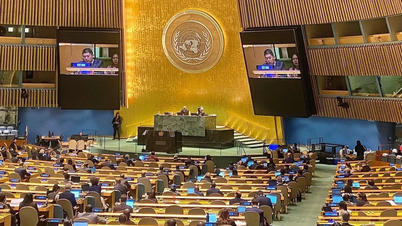In the context of the real estate market increasingly demanding transparency, convenience and legal safety, electronic notarization is considered one of the important solutions to support the digital transformation process, while contributing to reforming administrative procedures in this field with high transaction value and great legal risks.
However, for electronic notarization to be effective in the real estate sector, there needs to be comprehensive innovation from the mindset of building processes, designing technical systems, to perfecting the legal framework and training human resources to implement it.
Do not let the form be "electronicized"
Notarization is still a mandatory intermediary step in many real estate transactions, especially contracts for transferring, donating, and mortgaging land use rights.
However, this process is costing people and businesses a lot of time, effort and money, while technology can completely support significantly simplifying these procedures.
According to Mr. Phan Duc Hieu - Member of the National Assembly's Economic and Financial Committee, electronic notarization in real estate not only aims to meet the digitalization goal, but also must truly bring practical benefits such as reducing procedures, shortening processing time, reducing social costs, while still ensuring legal safety.

Mr. Hieu emphasized: "The conversion of paper documents into soft copies cannot be considered as digitization. Electronic notarization must be designed based on electronic thinking, that is, building a completely new process that is simpler, more effective and suitable for the digital environment."
Due to its specific legal nature and high transaction value, notarization in the real estate sector needs to be performed carefully, completely and in accordance with regulations.
However, many experts say that this does not mean keeping the old model and "digitalizing" the form, but rather changing the approach.
Associate Professor, Dr. Nguyen Quang Tuyen - Vice Chairman of the School Council, Head of the Faculty of Economic Law, Hanoi Law University, said that if well designed, electronic notarization in the real estate field can completely reduce the current administrative procedure volume by at least 30%.
"The problem is not only in the technical system, but also in retraining notaries in a digital direction, changing their professional mindset, and using digital tools to perform legal tasks," said Mr. Tuyen.
At the same time, notary offices also need to prepare a team of professional staff ready to support people and businesses to operate conveniently in the online environment.
Currently, according to the provisions of the 2024 Land Law, only some types of transactions related to land use rights must be notarized such as: transfer, donation, mortgage, capital contribution. Other transactions such as leasing, sub-leasing, conversion or transactions related to assets attached to land are not required to be notarized, leaving it to the people to decide for themselves.
According to Mr. Phan Duc Hieu, in the context of digital transformation and the trend towards streamlining procedures, it is necessary to re-evaluate the necessity of each type of transaction requiring notarization, especially in real estate transactions that are normal or do not generate high disputes.
"Notarization should only be retained in cases where it is absolutely necessary to ensure legal safety. Otherwise, transactions that can be digitized and authenticated via electronic systems should not continue to maintain the traditional notarization model," Mr. Hieu stated his opinion.
Ensuring the legal value of electronic data
An important point in implementing electronic notarization is to ensure the legal value of the notarization results performed online. According to experts, the design of the electronic notarization system must ensure that the notarized documents can be used immediately in subsequent administrative procedures, instead of requiring printing to resubmit hard copies.

According to Mr. Hieu, in the digital age, the concept of "copy" is gradually becoming unnecessary, because once the original data has been updated and authenticated on the system, it can be accessed and compared quickly and safely. This helps reduce printing and storage costs, while also speeding up the processing of administrative procedures related to real estate.
Mr. Bui Van Doanh - Director of the Vietnam Real Estate Research Institute, said that electronic notarization is an indispensable part of the effort to build a transparent and effective investment and business environment and reduce compliance costs, as in the spirit of Resolution No. 66-NQ/TW on innovation in law making and enforcement to meet the requirements of national development in the new era.
In fact, notarization is not required in transactions involving business elements. Therefore, if electronic notarization is widely deployed, it can significantly save time and costs, while still ensuring legal security through the design of reliable digital data storage and authentication mechanisms.
However, to do that, there needs to be a clear and unified legal framework on the legal value of electronic notarization, as well as a mechanism for interconnection between land data systems, notarization, finance and tax management. Real estate transactions are a sensitive field, of great value and prone to disputes if not strictly controlled legally. Therefore, electronic notarization needs to be designed as a support tool instead of a new obstacle.
Experts said that the process of building an electronic notarization system in the real estate sector requires coordination between many agencies, including the Ministry of Justice , the Ministry of Agriculture and Environment, the Ministry of Construction, with the participation of the Real Estate Association, the Notary Association and the business community.
Promoting electronic notarization in the real estate sector not only contributes to modernizing public administration, but is also a necessary step to build a transparent, safe, efficient and sustainable real estate market in the digital age./.
Source: https://www.vietnamplus.vn/cong-chung-dien-tu-giam-thu-tuc-tang-tinh-an-toan-cho-giao-dich-bat-dong-san-post1060992.vnp


![[Photo] General Secretary To Lam chairs the meeting of the Central Steering Committee on preventing and combating corruption, waste and negativity](https://vphoto.vietnam.vn/thumb/1200x675/vietnam/resource/IMAGE/2025/9/29/fb2a8712315d4213a16322588c57b975)
![[Photo] General Secretary To Lam receives US Ambassador to Vietnam Marc Knapper](https://vphoto.vietnam.vn/thumb/1200x675/vietnam/resource/IMAGE/2025/9/29/c8fd0761aa184da7814aee57d87c49b3)
![[Photo] General Secretary To Lam attends the ceremony to celebrate the 80th anniversary of the post and telecommunications sector and the 66th anniversary of the science and technology sector.](https://vphoto.vietnam.vn/thumb/1200x675/vietnam/resource/IMAGE/2025/9/29/8e86b39b8fe44121a2b14a031f4cef46)

![[Photo] Many streets in Hanoi were flooded due to the effects of storm Bualoi](https://vphoto.vietnam.vn/thumb/1200x675/vietnam/resource/IMAGE/2025/9/29/18b658aa0fa2495c927ade4bbe0096df)
![[Photo] National Assembly Chairman Tran Thanh Man chairs the 8th Conference of full-time National Assembly deputies](https://vphoto.vietnam.vn/thumb/1200x675/vietnam/resource/IMAGE/2025/9/29/2c21459bc38d44ffaacd679ab9a0477c)



![[Photo] National Assembly Chairman Tran Thanh Man chairs the 8th Conference of full-time National Assembly deputies](https://vphoto.vietnam.vn/thumb/402x226/vietnam/resource/IMAGE/2025/9/29/2c21459bc38d44ffaacd679ab9a0477c)



![[Photo] General Secretary To Lam chairs the meeting of the Central Steering Committee on preventing and combating corruption, waste and negativity](https://vphoto.vietnam.vn/thumb/402x226/vietnam/resource/IMAGE/2025/9/29/fb2a8712315d4213a16322588c57b975)












































































![[Infographics] An Giang tourism makes a spectacular breakthrough](https://vphoto.vietnam.vn/thumb/402x226/vietnam/resource/IMAGE/2025/9/30/e472f9f3f91d407ba4b7de460fb0481d)












Comment (0)